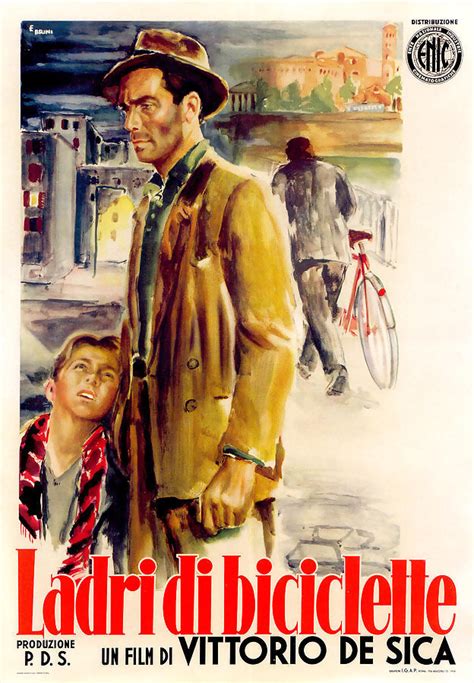The Bicycle Thief

Description:
The Bicycle Thief, directed by Vittorio De Sica, is a seminal work of Italian neorealism, depicting post-World War II Italy through the eyes of the working class. The film follows Antonio Ricci, an impoverished man who finally secures a job that requires a bicycle, only to have it stolen. With his young son, Bruno, Antonio embarks on a desperate search through the streets of Rome to reclaim his stolen bicycle, illustrating the harsh realities and struggles of poverty.Keywords:
Gritty Realism, Drama, Neorealism, Italian, Post War, ClassicWhat is the message of The Bicycle Thief?
"The Bicycle Thief," directed by Vittorio De Sica, conveys a poignant message about the struggles of post-war poverty and the impact of societal conditions on individual lives. The film illustrates the desperation and moral dilemmas faced by its protagonist, Antonio, who must steal to survive after his bicycle—a vital tool for his job—is stolen. It highlights themes of family, dignity, and the loss of hope, showcasing how economic hardship can erode personal values and relationships, ultimately emphasizing the fragility of human dignity in the face of adversity.
Is The Bicycle Thief worth watching?
Yes, "The Bicycle Thief" is definitely worth watching. Directed by Vittorio De Sica in 1948, it is a landmark of Italian neorealism. The film tells the poignant story of a father searching for his stolen bicycle, essential for his job and family's survival. Its emotional depth, realistic portrayal of post-war Italy, and exploration of themes like poverty, desperation, and human connection make it a powerful cinematic experience. The film's simplicity and honesty resonate with audiences, making it a classic that remains relevant today.
What does the end of bicycle thief mean?
The ending of "The Bicycle Thief" underscores the desperation and helplessness of the main character, Antonio, as he loses hope in a society that offers little support. After struggling to reclaim his stolen bicycle, which is essential for his job and family's survival, he ultimately resorts to theft himself, reflecting a cycle of poverty and moral compromise. The film concludes on an ambiguous note, highlighting the profound impact of socioeconomic struggles on personal integrity and the human condition, leaving viewers to ponder the systemic issues at play.
Why is it called The Bicycle Thief Halifax?
"The Bicycle Thief Halifax" is likely a reference to a specific adaptation or presentation of the classic Italian film "The Bicycle Thieves" (original title: "Ladri di biciclette") directed by Vittorio De Sica. The film, which premiered in 1948, tells the story of a man searching for his stolen bicycle, essential for his job. The addition of "Halifax" could indicate a local screening, a theater's special presentation, or a version set in Halifax, Canada, drawing inspiration from the original's themes of poverty and desperation.
Explore More Categories: